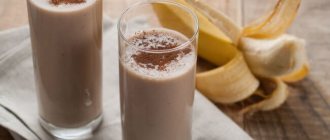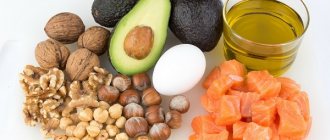- January 31, 2019
- Sports nutrition
- Natalie M
If you have a desire to gain muscle mass, then there is no way to do it without proper nutrition. In this case, the best training programs are also indispensable. Regular trips to the gym will not give the desired results. If you eat too little food and don't control the amount of protein, fat and carbohydrates you eat, your muscles simply won't grow. In this case, the body has nowhere to get energy to build muscle tissue. In this article, we will talk in more detail about how much BJU a person needs to gain muscle mass.
general information
A properly designed nutrition program aimed at gaining muscle tissue must be balanced and also contain all the necessary elements.
First, it is necessary to analyze those cases who initially have a lot of excess fat tissue. Such people need to lose weight, and then do BJU calculations to gain muscle mass. Despite popular myth, fat is physiologically simply impossible to turn into muscle tissue. The fact is that fat cells are not able to transform into muscle fibers under the influence of strength exercises. But this doesn't mean you shouldn't exercise. However, the diet should contain a minimum of high-calorie foods.
Weight gain and body fat
Excess weight in the form of fat deposits on the abdomen and sides can become an obstacle to the path to sculpted abs, so, first of all, you should lose weight. Fat stored by the body can be used as an additional source of energy only by creating a calorie deficit. Remember that it is impossible to turn fat cells into muscle tissue, and a diet to gain muscle mass will not bring visible results. Therefore, you need to follow the recommendations below:
- Use a low-calorie diet of 1200 kcal or 1400 kcal;
- Increase the number of cardiac loads, which will allow the body to more intensively use “static” fat deposits;
- Alternate aerobic exercises with light strength training, paying special attention to problem areas, that is, the sides and abs;
- Eat regularly at least five times a day so as not to feel hungry.
But the most important thing is to monitor BZHU (proteins, fats and carbohydrates). If you are overweight, you should reduce the amount of carbohydrate meals to 25% and increase the consumption of unsaturated fats. We suggest you start with the "Daily" or "Fit" menu, which will help you start your weight loss process within a few weeks. As soon as you bring your weight back to normal, you can begin to gain muscle mass by switching to a special high-calorie “Power” diet.
Approximate calculation of BZHU
Let's look at an example of calculating BJU for gaining muscle mass. A man who weighs 75 kg should adhere to the following ratio: 3150 kilocalories - 500 kilocalories more than the daily requirement. Of them:
- 1500 kilocalories - 375 g carbohydrates.
- 1050 kilocalories - 115 g fat.
- 600 kilocalories - 150 g of protein.
In this calculation, the BJU for gaining muscle mass is 2 g of protein per kilogram of body weight, and 5 g of carbohydrates per kilogram of body weight. As for fats, here they account for all the remaining calories.
Now let's take a closer look at where these numbers come from, as well as how to correctly calculate the BJU for gaining muscle mass for your own weight.
Calories
In order to increase muscle growth, a person must not only train correctly, but also provide his own body with the necessary amount of energy. At the same time, no sports supplements, for example, amino acids, proteins or creatine, give results if you spent all the accumulated energy from food during physical activity, and there were not enough calories for recovery and muscle growth. When considering the calculation of BJU for gaining muscle mass, it is imperative to take into account the number of calories from the food consumed.
What is a calorie surplus and how many kcal are enough for weight gain
Calorie norm
A caloric surplus is the amount of calories obtained from the daily diet that exceeds the weight maintenance level. In other words, this is a special condition when the calorie intake exceeds the person’s daily caloric intake.
Important! Muscles will not appear out of thin air. Building muscle mass will require additional calories.
How many calories would you need to consume in excess to gain weight? The calculation method will almost most accurately determine the maintenance rate. Having set this value, it is easy to create conditions for weight gain: increase the caloric intake of the daily diet by 10%.
After a week, your weight is checked. When increasing, the calorie intake remains the same. There is no result - they add another 10% and control the weight again after a week. There is an increase - the calorie content remains. The weight is in place - add another 10%. The optimal rate of weight gain is 250-500 g per week.
Weight control
How many calories do you need?
To calculate the number of calories needed, you need to use one of the formulas. After this, 10-20 percent is added to the resulting number, as a result of which you get the required number of calories that should be consumed per day for muscle growth. Let's look at the calculation using an example.
Initial data: the man weighs 75 kg, has a fast metabolism, and also a low initial percentage of fat.
For the calculation we will use Lyle MacDonald's formula. To do this, multiply 75 by 35, we get 2625 kilocalories. We multiply 2625 by 1.2, we get 3150 kilocalories. This indicator is the number of calories that you normally need to consume to build muscle mass. In this case, 500 kilocalories will be above the norm.
How to use this calculator
It is designed for people who want to increase muscle mass (build muscle) while maintaining a minimal amount of fat.
Formula used in the calculator
Daily caloric intake is estimated using the Mifflin-St. Geor formula.
There are many opinions regarding how much essential nutrients you need per day. However, it is generally accepted that consistently increasing your protein intake is beneficial if you are doing strength training.
The calculator estimates the optimal amount of nutrients to gain muscle mass with a minimum of fat.
- Protein is calculated at 2 grams per 1 kg of body weight.
- Fats should make up 20% of your total daily macronutrient intake.
- The remainder will be carbohydrates.
An effective training program for gaining muscle mass is absolutely necessary (otherwise all excess calories will be transformed into fat).
Squirrels
Protein is called the main building material for muscle growth. If you don’t know how to calculate BJU for gaining muscle mass, then pay attention to the fact that first of all you should learn to calculate the required amount of protein consumed.
During strength sports and bodybuilding, protein intake should be kept at 2 g per kilogram of body weight. You should start with the smallest amount, monitoring the results, and if necessary, increase the portion of proteins per day. However, this should only be done if your muscles are growing too slowly.
Protein products
When calculating BJU for weight gain for girls and boys, you need to pay attention to the fact that low-fat sources of proteins should be selected for the diet. This should include chicken breast, beef, fish, cottage cheese with a fat content of 0% to 9%, and egg whites. In addition, along with animals, it is also necessary to consume plant proteins, for example, lentils, beans, chickpeas. Plant protein is best absorbed by the body if it is consumed together with an animal. For example, you can cook chicken and have lentils and vegetables as a side dish. You can make various baked goods from chickpea flour and cottage cheese.
You should also pay attention to the fact that most athletes, in order to quickly achieve maximum results, drink protein shakes immediately after going to the gym, when their body is best able to absorb nutrients.
Carbohydrates
What else do you need to know about BJU for weight gain? Carbohydrates are the main source of energy for the human body. If there are not enough of them, then the person develops weakness, complete apathy, and the strength and desire for training becomes much less. When eating and calculating BJU to gain lean muscle mass, you need to consume about 4 g of carbohydrates per kilogram of body weight per day.
Carbohydrate foods
Once you know how to calculate BJU for weight gain, you should also become familiar with what specific foods you should eat and include in your diet. However, it is necessary to take into account that all carbohydrates are usually divided into slow and fast. This is very important when choosing certain foods after and before training. Slow carbohydrates are consumed within 2 hours. 1 hour before training you should consume fast carbohydrates, immediately after exercise you should also consume fast carbohydrates, as they are necessary to restore lost energy.
What can be classified as slow carbohydrates? This is buckwheat, rice, oatmeal. Fast carbohydrates include sweets, fruits, and baked goods. As a source of fast carbohydrates, it is best to give preference to fruits, as they contain useful minerals and vitamins for the body. But if you have nothing on hand except a bun, then you can eat it. The main thing is that such cases are not constant, because fast carbohydrates contain a large number of calories, and they are digested quickly, without saturating the body for a long time. As a result, a person gains a large amount of excess fat.
It is also necessary to avoid foods that contain large amounts of sugar. This includes sweet juices, candies, and sodas. But pasta can not be excluded from the diet, but you should watch the calories, without adding mayonnaise and other fatty sauces.
There is no need to be afraid of slow carbohydrates if you want to gain muscle mass. You need a lot of energy to recover and train. Buckwheat, rice, potatoes, legumes should be indispensable in your diet. The main thing is to watch the consumption of fats, that is, foods should be stewed, boiled, but under no circumstances fried. After all, one tablespoon of simple vegetable oil already contains about 100 kilocalories.
What foods contain fats?
We have shown you an example of how to calculate the daily intake of proteins, fats and carbohydrates. Based on these data, you can independently calculate the percentage of BJU for gaining muscle mass.
Speaking specifically about fats, you should be very careful here. You will have to give up some foods, including pork, butter, fast food, and various sauces. In a proper diet, sources of fat should be only vegetable oils and only in limited quantities, nuts and fatty fish. While gaining weight, you should not switch to consuming low-fat dairy products. It is allowed to consume cottage cheese with a fat content of 9%, milk with a fat content of 3.2%. In this case, you should not go beyond the daily norm of consumed kilocalories.
If you begin to feel much better, and during training you feel a surge of strength, then you can reduce the amount of fat consumed per kilogram of body weight to 1 g. But if you feel very weak, then the amount of carbohydrates increases, but not more than 2 g per kilogram body weight. No one will ever be able to definitively answer the question of how much fat you should consume every day, because every body is unique. To achieve the best results, a person must try everything on himself. Try changing the ratio of fats and carbohydrates on rest and training days, this approach may be most effective for you.
How not to get lost in calculations?
Calculating the ratio of BJU for gaining muscle mass is not the easiest task, taking into account the energy value of the daily menu. We decided to make the task easier and compiled several nutrition lines, where we already counted calories and derived the required ratio of proteins, fats and carbohydrates:
- The “Power” menu contains a daily requirement of 2600 kcal, divided into 6 meals. With such a diet, the body will receive more energy than it expends. In this case, intense physical activity, especially strength, is necessary.
- The “Fit” menu is an ideal option for those who are losing weight. The daily value is only 1200 kcal, including 5 dishes. Not receiving enough energy, the body will begin to waste stored fat on the sides, abdomen, and thighs, which will tone your body and soon allow you to start gaining muscle. Don't forget about active aerobic sports.
The peculiarity of our lines is the variety of dishes and their proper preparation. We invite you to place an order for 5 days and make sure that healthy food can be delicious!
What to do if the weight does not increase?
There are cases when, despite a properly formulated diet, a person does not gain muscle mass. This is possible for several reasons:
- Incorrect training, during which the physical activity does not correspond to the goals and objectives.
- Lack of sufficient recovery time between trips to the gym. As a rule, it is imperative to set aside time for proper rest and sleep.
- Excessive nervous tension. The fact is that strong emotions provoke excessive production of cortisol, as well as adrenaline, which prevent muscle gain. In addition, cortisol and adrenaline destroy muscles.
Don't get hung up on percentages and numbers. This is just a starting point. Start with the indicators that you received during the calculation. If there is no progress after a month, then you need to increase the calorie content of your diet. If, along with muscles, you also gain a large amount of fat mass, then you need to reduce your calorie intake. Try changing the ratio of proteins, fats and carbohydrates.
Prepare a meal plan for yourself in advance. As a rule, after some time you will gain the necessary experience, as a result of which you will begin to clearly understand exactly how this system affects your body, which foods and in what quantities help you gain muscle mass.
Tips for beginner athletes
When building muscle, you need to add different foods to your menu.
Thus, the body will not lack any vitamins or microelements. The following rules will help beginning athletes:
- The daily menu should be divided into 5-6 meals. This will help the food be better absorbed, without the unpleasant feeling of overeating, etc.
- Do not use types of food processing that destroy its structure. For a healthy diet, stewing, boiling and baking are suitable. All vegetables, fruits and herbs should be consumed exclusively raw.
- When consuming fats, do not exceed the permissible amount. In addition, it is necessary to balance the menu so that all nutritional elements are present in it.
- Controlling the amount of muscle mass gained. It should not grow by more than 0.8 kg per week, because the extra kilograms gained will be transformed into body fat.
- Maintain psychological balance. When stressed, the level of the hormone cortisol in the blood increases, which causes the destruction of muscle fibers and increased formation of adipose tissue.
Products for building muscle should be high in calories and contain a large amount of nutrients.
To achieve good results from training, you need to regularly engage in physical activity, maintain a daily routine (wakefulness, rest and sleep), and eat only those foods that promote the growth of muscle tissue.
Reviews from athletes and coaches
Reviews from novice athletes indicate that in order to gain muscle mass, it is simply necessary to calculate the proteins, fats and carbohydrates consumed per day. Without such control, you should not count on any results. Many note that they have to deviate from specific formulas for calculating BZHU. The fact is that each body is individual; for one person, 150 g of fat is required per day, while for another, 300 g is not enough.
As for the reviews of experts, they recommend not eating saturated fats, as well as fast carbohydrates, which are converted into fat.











